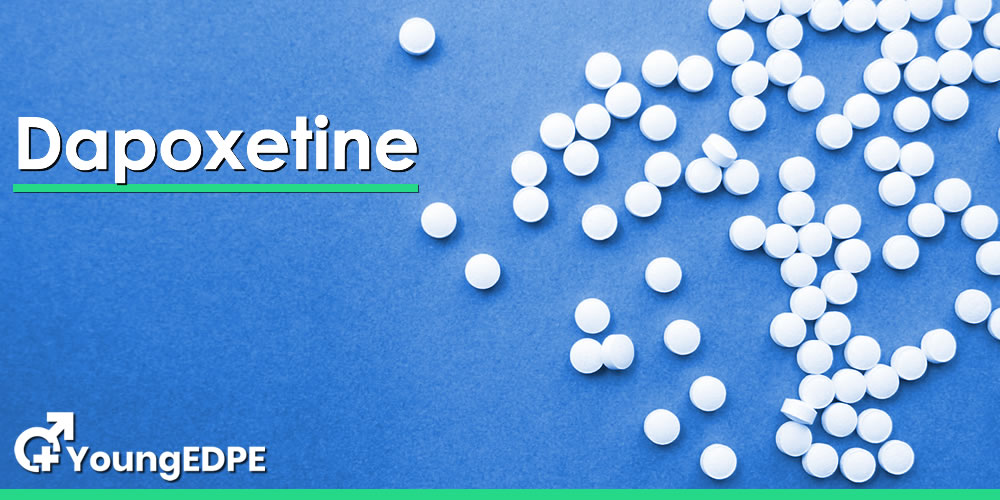
Premature ejaculation is a condition that affects thousands of men all over the world no matter the age. It is characterized by an inability to control or delay orgasm, resulting in unsatisfying sex for both partners. In recent years, Dapoxetine has emerged as a potential solution to help treat this frustrating condition and improve sexual pleasure for couples. While much research still needs to be done on its effects, clinical trials have been promising in terms of efficacy and safety.
Dapoxetine, also known as Priligy or its generic name, dapoxetine hydrochloride, is a medication used to treat premature ejaculation in men. It belongs to a class of drugs called selective serotonin reuptake inhibitors (SSRIs) that work by increasing the levels of serotonin in the brain. The drug works by delaying ejaculation and allowing men to last longer during intercourse.
Dapoxetine is taken orally and usually comes in tablet form. It should be taken 1-2 hours before sexual activity to work best. Its effects can last up to 4 hours after taking the medication, so it can be used as needed rather than having to take it every day.
Dapoxetine is a safe and effective treatment for premature ejaculation when taken as directed and combined with sexual counseling. It has been shown to significantly increase the time men can last during intercourse, allowing them to enjoy a more satisfying experience with their partner.
Premature ejaculation (PE) is a common male sexual disorder characterized by early and frequent ejaculation with minimal sexual stimulation before, during, or shortly after penetration. It can be defined as the inability to control or delay orgasm for a sufficient amount of time. PE generally occurs more often than not in men during sexual activity. Around one in three men is estimated to experience PE at some point.
The causes of premature ejaculation are not fully understood but may include psychological factors such as anxiety or guilt; physiological factors like over-sensitivity of the penis; hormonal imbalance; and medical conditions like thyroid disease or prostate inflammation. Some researchers believe that genetics also plays a role in its onset.
PE can significantly impact a man’s self-esteem and interpersonal relationships. It is important to seek help if you are experiencing PE, as proper treatment can successfully manage it.
Erectile Dysfunction (ED) is a condition that affects men’s ability to achieve or maintain an erection firm enough for sexual activity. Physical factors, psychological issues, or both can cause it.
Physical factors that can cause ED include underlying health problems such as diabetes, high blood pressure, heart disease; certain medications; and injuries or surgeries involving the pelvic area or spine. Psychological issues like stress, anxiety, and depression can also lead to ED. In many cases, both physical and psychological factors are involved in the development of ED.
Dapoxetine is a medication that is used to treat premature ejaculation in men. It works by delaying the release of serotonin, an important neurotransmitter in male sexual arousal and orgasm. Specifically, dapoxetine prevents serotonin reuptake into nerve cells, which helps delay ejaculation. In addition to treating premature ejaculation, it may also be effective for treating erectile dysfunction (ED).
When taken just before intercourse, dapoxetine has been found to improve erectile function in some men with ED. This is thought to be because it increases dopamine, norepinephrine, and nitric oxide levels, all of which help enhance blood flow to the penis during arousal.
Dapoxetine can also improve the quality of erections by increasing the intensity of penile sensations and allowing for more control over ejaculation. With improved blood flow and greater control, men may find it easier to maintain an erection.
Compared to other procedures such as P-shot and surgeries for ED and PE, there is no need foranesthesia, which makes it protective against the side effects of going under. Similarly, there is no risk of scarring like in surgery associated with a significant risk of scarring.
Furthermore, dapoxetine has no downtime, and you can intake the meds as per your doctor’s prescription without any preparation.
Unlike cosmetic procedures and surgeries, the results of dapoxetine are reversible. This means that users can cease taking the drug whenever they want without lasting changes to their bodies or health. It also allows them to adjust their dosage as needed to find the most effective result for their particular situation. In addition, dapoxetine is much less expensive than many other treatments, making it a viable option even for those with limited financial resources.
Unlike many other treatments, it requires no invasive procedures or surgery. It can be taken in pill form without causing any pain or discomfort. This makes dapoxetine a good option for those who want to treat their sexual issues without the risk of side effects associated with more extreme treatment methods.
Additionally, dapoxetine has been clinically proven to improve ejaculation control in most men and improve sexual performance overall. As such, it is a reliable solution that can be incorporated into a man’s lifestyle with minimal disruption. With its effectiveness and ease of use, dapoxetine is becoming increasingly popular among young men aged 25 to 40 looking to take control of their sexual performance and enjoy a more satisfying sexual experience.
Dapoxetine tablets are typically taken orally with a full glass of water. The recommended dosage for adults is 30 mg, taken as a single dose approximately one to three hours before sexual activity. Depending on the individual’s response and tolerability, the dosage can be increased to 60 mg. It is not recommended to exceed this dosage as it could increase the risk of side effects. For elderly patients or those with liver impairment, the dosage should be reduced to 30 mg per day.
As dapoxetine has a short half-life, its effects will wear off within 24 hours, and therefore multiple doses in one day should be avoided. Doses should also be taken only once daily. It is important to take the tablets exactly as prescribed by your doctor.
It has generally been found to be most effective for men aged 21 to 40, it can be prescribed to those outside this age range, depending on the individual and their condition. Dapoxetine works by increasing the serotonin in the brain, helping delay ejaculation. The medication typically comes in tablet form and should be taken 1-3 hours before sexual activity. If you are considering dapoxetine, talk to your doctor about whether or not it is right for you. They will be able to assess your individual needs and determine if this treatment would work best for you.
Dapoxetine is generally well tolerated. However, some of the common side effects associated with dapoxetine are:
1. Headache
2. Diarrhea
3. Nausea
4. Insomnia
5. Fatigue
6. Dry Mouth
7. Blurred Vision
8. Reduced Libido or Difficulty Achieving Erection
9. Sweating or Flushing
10. Mood Swings or Irritability
11. Stomach Upset or Abdominal Pain
12. Sleepiness or Drowsiness
13. Decreased Appetite
Furthermore, not everyone will experience the same side effects when taking dapoxetine, and some people may not experience any side effects at all. Additionally, the severity of side effects may vary from person to person.
You should contact your doctor immediately if you have an allergic reaction (trouble breathing; swelling of your lips, tongue, or face; hives).
Dapoxetine should not be used to treat any heart conditions or disorders. It may increase the risk of cardiac abnormalities and cause serious harm if someone with a pre-existing heart condition takes it. Therefore, patients with known or suspected cardiovascular disorders should consult their healthcare provider before taking dapoxetine.
In addition, it is important to consult a doctor before taking dapoxetine if you have hypertension, chest pain, or any other cardiovascular symptoms, as they may indicate an underlying cardiovascular problem that requires additional medical attention.
Dapoxetine should be avoided in patients with a known hypersensitivity to it or any of its components. It should also be avoided if the patient has a history of allergies, as it can cause an allergic reaction. Additionally, dapoxetine may interact with other medications, so people with allergies should talk to their doctor before taking this medication.
Patients should also inform their doctor about any existing medical conditions and medications they are currently taking to avoid any potential interactions. Finally, dapoxetine is not recommended for those under 18 due to inadequate studies on its safety in this age group.
Dapoxetine is not recommended for people with Bipolar disorder because it can increase the risk of mania and other psychiatric side effects. It may also trigger a rapid cycling pattern in those with rapid-cycling Bipolar disorder, causing severe mood swings and episodes of depression or mania.
Additionally, dapoxetine can interact badly with medications used to treat bipolar disorder, such as Lithium and Valproic acid. Therefore, it is best to avoid using this drug if you have been diagnosed with Bipolar disorder.
Patients with liver disorders should avoid taking Dapoxetine as it can potentially increase the risk of hepatotoxicity (liver damage). Patients with a pre-existing liver disorder or liver disease are especially vulnerable and should not take this medication without consulting their doctor. Generally, it is important to note that patients with any liver disorder should discuss their condition with a healthcare professional before taking Dapoxetine.
Additionally, patients should be aware of signs of hepatotoxicity, such as fatigue, abdominal pain, yellowing skin/eyes, dark urine, and appetite loss. Medical attention should be sought immediately if these symptoms occur after taking Dapoxetine. Taking Dapoxetine can also cause a rise in liver enzymes, so individuals should have their levels monitored regularly by their doctor.
The effects of dapoxetine typically last for one to three hours. However, this can vary depending on the individual and other factors such as their metabolism. Taking a higher dose of dapoxetine may lead to longer lasting effects. It is important to note that dapoxetine will not cause a man to remain erect after ejaculation; rather, it delays the ejaculatory reflex by increasing serotonin levels. Therefore, its effects are limited to delaying ejaculation rather than prolonging sexual intercourse.
Furthermore, dapoxetine is not recommended for daily use as this can lead to dependence on the drug and possible side effects.
In conclusion, while using dapoxetine to treat certain issues, such as premature ejaculation and erectile dysfunction, might be an entirely new concept for many, it has undoubtedly made its way worldwide due to its promises of relief. It is non-invasive, painless, and reversible – traits that make it a preferred choice for many individuals.

Premature ejaculation and erectile dysfunction are usually deemed as sexual disorders which men develop in old age; however, recent surveys have found that younger people are equally susceptible or even more prone to develop such issues. Let’s find out what are the causative factors that have resulted in such a high preponderance of these sexual […]

Premature ejaculation- one of the worst bedroom blues where you desperately chase satisfaction but end up in frustration, depression, and embarrassment. It leaves you breathless but nowhere near the finish line. The question lingers in your mind, “Why can’t I just…?” Well, no need to worry. There are various treatment options for premature ejaculation, and […]

One popular treatment medicine to combat Premature Ejaculation is Sertraline (Zoloft®). It is an antidepressant that has shown its potential in treating PE. A clinical trial published in the International Journal of Impotence Research included 46 potent men diagnosed with premature ejaculation. They were given Sertraline from 25mg to 100mg per day. They experienced an […]

Did you know premature ejaculation is the most common sexual disorder among males affecting upto 30-40% of the male population worldwide (1)? Men usually tend to hide their sexual problems because of societal pressure and the stigma related to sexual dysfunction. As a result they may turn to unhealthy coping mechanisms like smoking or drinking. […]

Taking SSRIs (Selective Serotonin Reuptake Inhibitors) for depression or anxiety can sometimes lead to sexual dysfunction. This condition is called Post SSRI Sexual Dysfunction (PSSD). The risk of PSSD is low but still notable—about 1 in 216 people who take SSRIs may end up with PSSD. In general, PSSD affects about 4.3 in every 100,000 […]

When seeking to gain more control over your ejaculation, you may have come across many different products claiming to help. But knowing where to start as someone looking for a reliable solution can be difficult. One product that is growing in popularity is Promescent Delay Spray, formulated with special ingredients designed to create longer-lasting pleasure […]